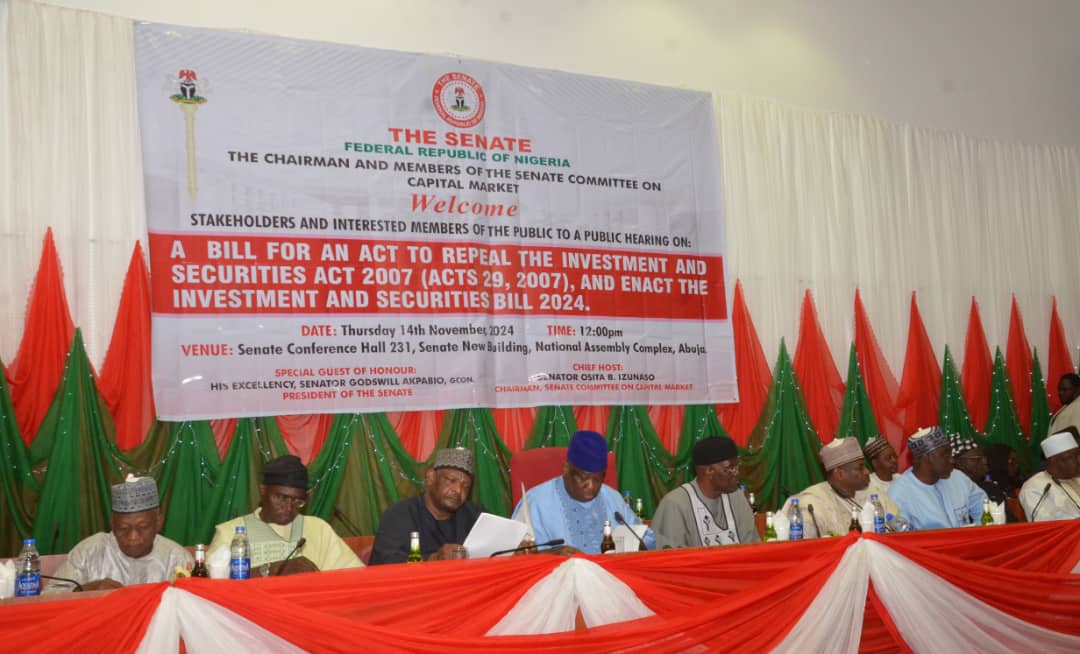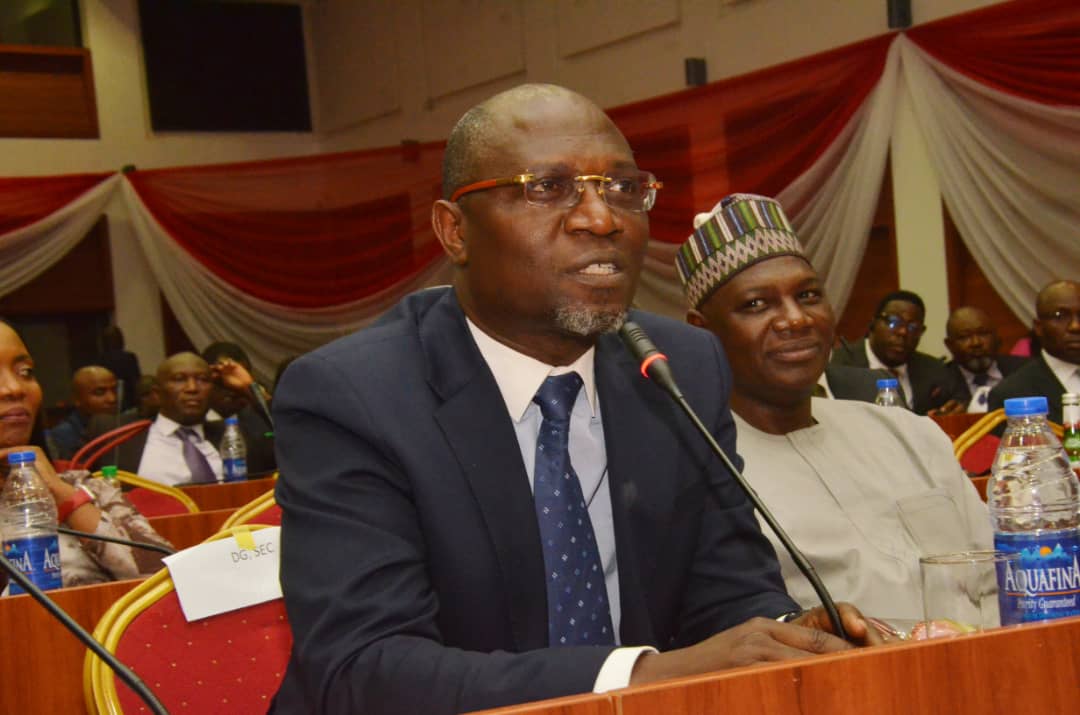The Securities And Exchange Commission SEC has urged members of the Senate Committee on Capital market to be on same page with other stakeholders for the passage and enactment of Investment and Securities Bill 2023 by the Nigeria’s Senate.
SEC argued that the Investments and Securities Bill 2023 currently enjoying the overwhelming support of stakeholders in the Nigerian capital market, said there was a collective resolve in the capital market community to work together towards the enactment of the Bill during the life of the 10th National Assembly.

SEC maintained that World class capital markets are indispensable to the functioning of a modern economy,and no economy can achieve any meaningful advancement without the important role capital markets play in supplying medium to long term finance. Added that Nigeria needed deserved a world class capital market to facilitate the on-going economic diversification.
The Commission said the passage and enactment of the Investments and Securities Bill 2023 will be a pivotal step in this direction.
Emomotimi Agama,Director-General, Security and Exchange Commission made this submission at a public hearing organized by the Senate Committee on the Capital Market chaired by its Chairman,Senator Osita Izunaso,in respect of the Investments and Securities Bill OSB) 2023.
The Commission assured its utmost respect for National Assembly,said it would continue to fully support initiatives geared towards strengthening the capacity of the legislature to actualize its statutory mandate.
The Commission praised the President of the 10th Senate and the Chairman and members of the Senate Committee on the Capital Market for organizing the public hearing , pledged to collaborate with the National Assembly with respect to the consideration and passage of the
Investments and Securities Bill 2023.
The presentation partly read;
THE INVESTMENTS AND SECURITIES ACT 2007 AND THE NEED FOR A NEW ENABLING
STATUTE FOR THE NIGERIAN CAPITAL MARKET
3. From its inception, the Nigerian capital market has had a number of enabling legislations; from the Capital Issues Commission Act 1973 to the Securities and Exchange Commission 1979 and then to the Securities and Exchange Commission Act 1988. After that, the Investments and Securities Act was passed in 1999. The current principal statute governing operations in the market is the Investments and Securities Act, No. 29 of 2007.
4. Having operated the ISA 2007 for a number of years, the Commission observed areas requiring review in order to strengthen existing provisions, remove ambiguities, introduce new provisions that would enhance the international competitiveness of the Nigerian capital market and reposition the market to catalyze National economic transformation.
5. Given the highly technical and dynamic nature of the capital market as well as the market’s evolution since the passage of the ISA 2007, it was the consensus by major stakeholders in the capital market community that rather than wholesale amendments, a complete overhaul of the ISA through a new Bill would be more expedient towards the objective of consolidating the efficiency, transparency and viability of the market. It is also noteworthy that the Nigerian Capital Market Masterplan (2015-2025), which was launched by the Commission in 2014 and revised in 2021 , strongly recommends the holistic strengthening of the Legal and Regulatory Framework underpinning capital market operations.
6. In 2016, a market-wide Technical Committee chaired by Chief Anthony Idigbe, SAN was constituted to review the ISA 2007 and set an agenda for legislative action in this regard. The Committee took into cognizance major domestic and global events in the capital market since the enactment of the ISA 2007 which had necessitated certain innovations in securities regulation. The Technical Committee also carefully considered the International Organization of Securities Commission’s principles of securities regulation which require a regulator to be operationally independent and accountable in the exercise of its functions and powers and for it to have adequate powers, proper resources and the capacity to perform its functions and exercise its powers.
7. The Bill produced by the Technical Committee was subsequently fine-tuned in line with current market realities and further input from other stakeholders. The Bill was presented to the House of Representatives of the 9th National Assembly. After due legislative consideration, the House of Representatives passed the Bill and transmitted same to the Distinguished Senate of the 9th National Assembly for concurrence.
8. The Distinguished Senate graciously granted its concurrence and the Bill was forwarded for Presidential Assent. Based on some thematic concerns, the President withheld assent to the Bill. Working with the capital market community, the Commission reviewed these concerns and further amended relevant provisions of the Bill before the document was Are-presented to the 10th National Assembly.
HIGHLIGHTS OF THE INVESTMENTS AND SECURITIES BILL 2023
9. Please permit me to present highlights of the major innovations in the Investments and Securities Bill 2023.
9.1. Establishment, Objectives, Functions and Powers of the Securities and Exchange Commission
The Objectives, Functions and Powers of the SEC are clearly separated and stratified in the Bill as against being subsumed under one Section (Section 13) in the extant Act. Additionally, new Functions and Powers have been provided to strengthen the SEC’s enforcement capacity in line with requirements of the Enhanced Multilateral Memorandum of Understanding (EMMoU) with IOSCO, to enable the SEC retain its “Signatory A” status.
Some of the new functions are:
i) Register and regulate derivatives market.
ii) Register and regulate Collateral Management Companies and Warehouses that issue warehouse receipts.
iii) Review the fairness of mergers and acquisitions of public companies; and iv) Prevent and sanction unauthorised and illegal dealing in securities and investment schemes.
Some of the new powers are:
i) to compel auditing information including audit work papers, communications and other information relating to the audit or review of financial statements of regulated entities ii) to compel subscriber records held or maintained by telephone service providers located within the jurisdiction of the Commission, iii) to compel internet service providers and other electronic communication providers, to produce, subscriber records held or maintained by the service providers in the form prescribed by the Commission iv) to compel recordings of telephone conversations or other electronic communications held or maintained by persons regulated by the Commission;
v) to compel a person’s physical attendance to take or, where permissible, that person’s statement or testimony under oath, regarding the matters set forth in the request for assistance.
vi) to register and regulate shareholders’ associations.
9.2. Inclusion of the National Pension Commission on the Board of the Commission and Its membership:
A recommendation is made for the inclusion of the National Pension Commission (PenCom) on the SEC Board for increased collaboration between the two agencies, particularly to encourage greater investment of pension funds and in capital market products/instruments.
9.3. Registration/Regulation of Exchanges and Financial Market Infrastructures
Securities Exchanges are now classified into Composite Exchanges and Non-composite Exchanges. A Composite Exchange is one in which all categories of securities and products can be listed and traded, while a Non-composite Exchange focuses on a singular type of security or product. Furthermore, the duties/responsibilities of Exchanges have been expanded and the conditions for revocation of registration clearly stated. There are also new provisions on Financial Market Infrastructures such as Central Counter Parties, Clearing Houses, Trade Depositories etc.
9.4. Management of Systemic Risk
A new part on the management of systemic risk has been introduced covering the following themes:
i) monitoring, management and mitigation of systemic risk in the Nigerian capital market; arrangements with other regulators to facilitate access to information required on entities that are regulated by other regulators; sharing of information between financial sector regulatory authorities or government agencies; and use of a legal entity identifier to provide for proper monitoring of systemic risks.
9.5. Public Offers, Sale of Securities and Invitations to The Public
The Bill expands the categories of issuers, as a key step towards the introduction of new innovations and offerings such as crowd-funding as well as the facilitation of “commercial and investment business activities”, subject to the approval of the Commission and other controls stipulated in the Bill.
9.6. Mergers, Take-Overs and Corporate Restructurings
The merger control provisions in the ISA 2007 have been deleted in view of the establishment of the Federal Competition and Consumer Protection Commission. In its place, new provisions cover mergers, takeovers and other corporate restructurings of public companies for the purpose of determining the fairness of transactions.
9.7. Collective Investment Schemes
The Bill expands the definition of a Collective Investment Scheme to include schemes offered privately to qualified investors. Minor reviews on various Sections of the extant law have been carried out to provide greater clarity. Very significantly, the Bill introduces an express prohibition of Ponzi/Pyramid Schemes as well as other illegal investment schemes. The Bill also prescribes stringent jail terms and other stiff sanctions for the promoters of such schemes.
9.8. Investor Protection Fund
A vital provision in the Bill is the new stipulation that the Investor Protection Fund (IPF) set up by Securities Exchanges would compensate investors who suffer pecuniary losses arising from the revocation or cancellation of the registration of a dealing member firm. In the extant law, compensation from the IPF is limited to instances of “bankruptcy”, “insolvency” or other acts of “negligence” by a dealing member firm.
9.9. Commodity Exchange and Warehouse Receipts
This Bill contains an entirely new Part which provides for the regulation of Commodity Exchanges and Warehouse Receipts. These provisions are essential to allow for the development of the entire gamut of the Commodities ecosystem.
9.10. Issuance of Securities by Federal, State, and Local Governments and Their Agencies
The Bill contains provisions which address the existing restrictions in respect of raising of funds from the capital market by Sub-Nationals to allow for greater flexibility in this regard.
9.11. Establishment, Jurisdiction, Authority and Procedure of the Investments and
Securities Tribunal
Some provisions in the ISA 2007 pertaining to the Composition of the Tribunal, functions of the Minister, Vacancy, constitution of the Tribunal, qualification and appointment of the Chief Registrar as well as the jurisdiction of the Tribunal have been amended in the Bill to enhance the ability of the Tribunal to optimally discharge its mandate.





